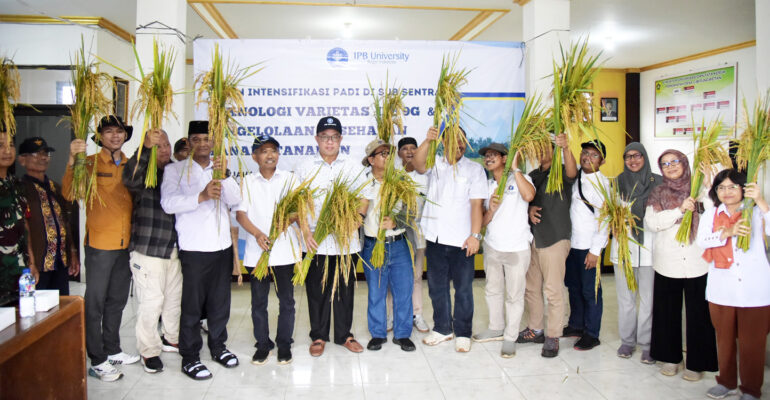Addressing the Issue of 100 Ha of Dry Land in Pamijahan, IPB 9G Rice Ready for Implementation

The IPB 9G rice variety is beginning to be implemented on dry land in Cibitung Wetan Village, Pamijahan Subdistrict, Bogor Regency. This effort aims to address the issue of extensive dry land and water shortages affecting up to 100 hectares (ha) in the area.
The planting of IPB 9G rice is being carried out in stages. The initial planting covered 0,75 ha with harvesting planned for three months later. A month after that, the planting area was expanded to 10 ha. Over the next year, the goal is to expand the planting to reach 100 ha.
The Rector of IPB University, Prof Arif Satria, stated that this step is a concrete effort by IPB University to contribute to national food security while also promoting agriculture in Bogor through the innovations it produces.
“Our hope is that the more IPB’s innovative technologies are utilized by the public, the more they can help improve farmers’ productivity and community welfare. We hope this can bring new spirit and optimism to rural communities facing water-related challenges,” he said.
Currently, IPB 9G upland rice has been implemented in various regions across Indonesia, including Sumatra, West Java, and Central Java. “IPB University is ready to collaborate with both central and local governments, and this upland rice variety offers a crucial solution to existing irrigation problems,” emphasized Prof Arif.
As an amphibious variety, IPB 9G rice is also being applied in wetland areas (rice fields), covering 10 ha in Cibitung Wetan Village and surrounding areas. In practice, the use of IPB 9G rice is combined with soil and plant health management technologies.
This technology includes the application of organic matter, optimization of inorganic fertilization, minimizing pesticide use, and bio-immunization using Plant Growth Promoting Rhizobacteria (PGPR) and endophytes.
This intensification has increased productivity from 3,5 tons of dry unhusked rice per hectare to 5,0 tons per hectare a 42,8% increase. The program involved 23 farmers and five recent graduates from IPB University’s Faculty of Agriculture.
Dean of the Faculty of Agriculture at IPB University, Prof Suryo Wiyono, stated that the IPB 9G variety and the soil and plant health management package are proven technologies that can be implemented on a national scale.
For context, intensification efforts have so far been more focused on central rice production areas rather than sub-centers. In fact, sub-center regions are estimated to make up about 60 percent of Indonesia’s rice-growing areas, including Bogor.
“Moreover, productivity in central production areas is already high and difficult to increase further, such as in the northern coastal area of West Java. Therefore, boosting productivity in sub-center areas can be done more easily and with lower energy input,” he explained.
Kamaludin, the Chief of Cibitung Wetan Village, said, “We are very happy and greatly assisted by this initiative. The IPB 9G variety addresses the irrigation and dry land issues in our village.”
He added that planting rice while paying attention to soil and plant health management has proven to increase harvest yields. “We hope this program will advance agriculture and improve the welfare of farmers in our village,” he said.



